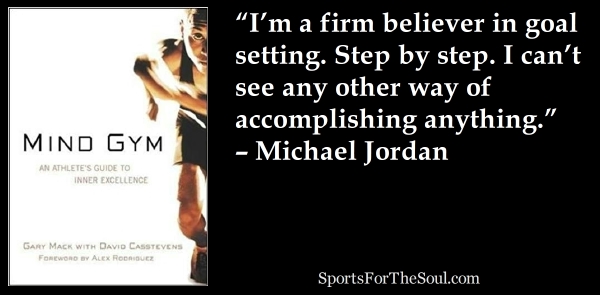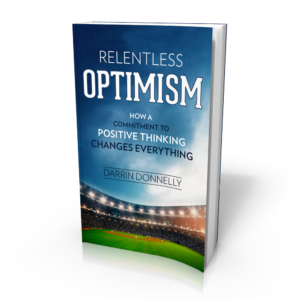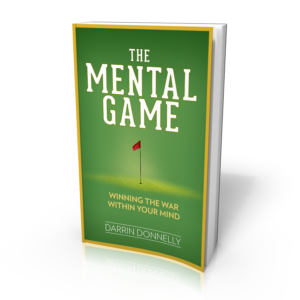 “I’m a firm believer in goal setting,” Michael Jordan once said. “Step by step. I can’t see any other way of accomplishing anything.”
“I’m a firm believer in goal setting,” Michael Jordan once said. “Step by step. I can’t see any other way of accomplishing anything.”
The power of goal-setting in undeniable. Extensive studies have proven that people who set clear goals are much more successful than people who don’t.
However, when it comes to setting goals, too many people make one crucial mistake that hurts them more than it helps them. The late sports psychology consultant, Gary Mack, explained this error…
You should develop performance goals as well as outcome goals. A performance goal, or action goal, is something you can control.
If you play baseball and want to hit .300, then you are going to have to take a certain number of pitches in batting practice. I ask major league hitters to concentrate on having four quality at-bats each game. That becomes their goal rather than, “I’m going to get two hits every game.” Focusing on quality at-bats is an action goal. The outcome will take care of itself.
I encourage athletes to set daily or short-term goals. The way to achieve long-term goals is to break them down into small steps. Effective goal setting is like a staircase. Each step is an action step—an increment of progress.
Two of our greatest fears are the fear of being out of control and the fear of the unknown. Setting and attaining small goals provides the player with positive feedback and the motivation to get better. As he improves, his confidence grows.
Goals are dreams with time lines. Seek progress rather than perfection.
— Gary Mack, from his book Mind Gym
When most people set goals, they focus only on outcome goals. To win a state championship, to lead the company in sales, to write a bestseller, to dominate the market—these are all outcome goals.
Outcome goals are important. They give us a vision for where we want to end up. They’re exciting and they motivate us.
However, outcome goals alone can lead to frustration. They can start to feel so far off that we wonder if we’ll ever reach them, which leads to waning enthusiasm.
We also have to face the fact that we don’t have total control over outcome goals. Several outside factors play a role in the ultimate outcome—competition, changing market environments, fluke scenarios, etc. As much as we may hate to admit it, we can’t deny this fact of life.
That’s why high achievers set outcome goals AND performance goals.
Performance goals are shorter-term goals that you have total control over. It’s the daily actions you must take in order to eventually reach your biggest outcome goals.
If winning a championship at the end of the season is the goal, you have to face the reality that such a goal will not be accomplished all at once. It’s the result of a long and grueling offseason, regular season, and postseason. If winning a championship is your sole goal, the pressure can become too great in the week-to-week and day-to-day grind of a season. That’s why the outcome goal needs to be broken down into daily performance goals—things you’re in control of right this moment.
What do I have to do today in order to win a championship at the end of the year? How many reps do I need to hit in the weight room? How many sprints do I need to run? How many shots do I need to take?
These are all performance goals that you are in complete control of. And as you achieve each one, it builds your confidence and gets you one step closer to the greater outcome goal you have set.
This goal-setting strategy goes well beyond sports.
How many sales calls do I need to make today? How many words do I need to write today? What part of my product do I need to work on improving today?
Picture your outcome goal as the destination way off in the distance. It’s calling you towards it and it’s always on your mind. Then, make sure you’ve got a daily agenda set for what needs to be done right now in order to get you closer to that destination.
Set big, crazy goals and take time to visualize those goals becoming reality. Then, attack the day with a game plan for achieving the things that must be done right here, right now.
Focus on making incremental progress. The outcome will take care of itself.







